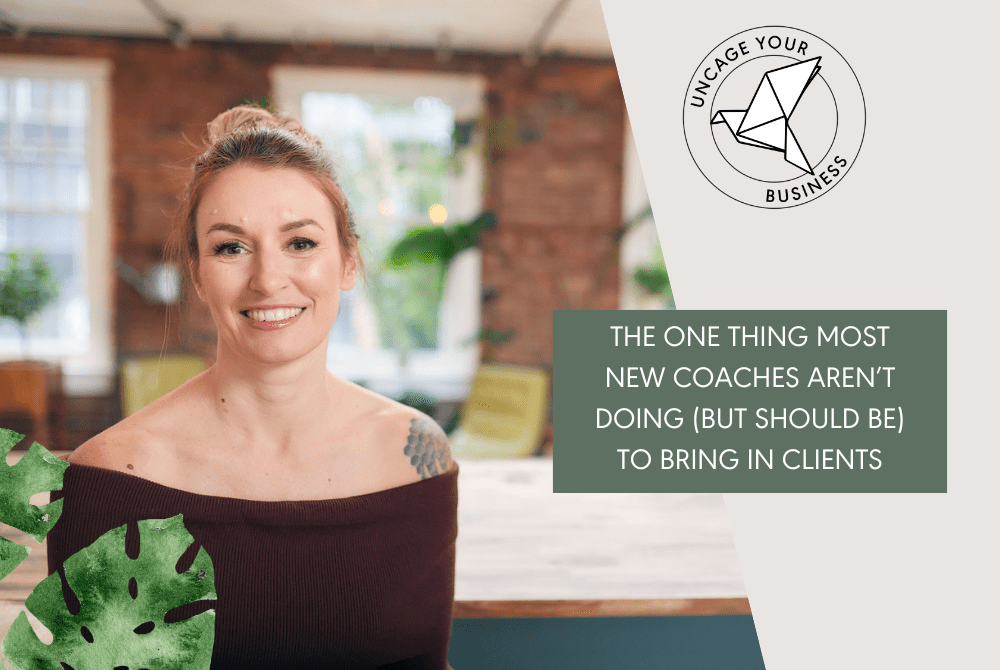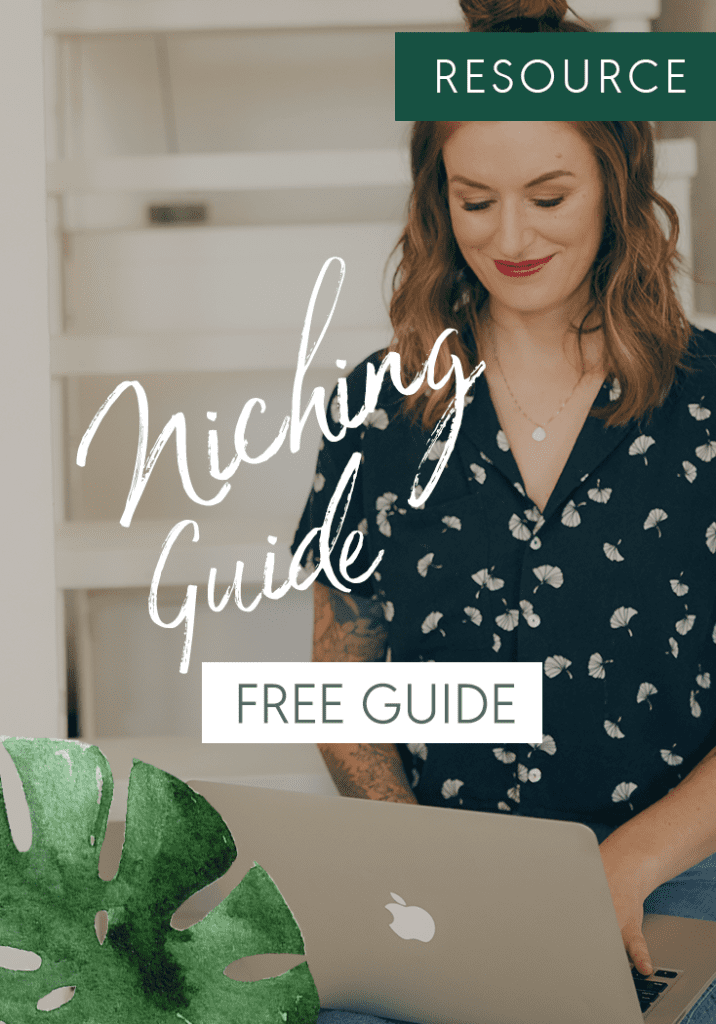
The one thing most new coaches aren’t doing (but should be) to bring in clients
Hey new coach! I know you’re super passionate about your work and excited to go out there and sell your coaching services. So you run around telling everyone and their great aunt about your new business:
“It’s life coaching! It’s not therapy but it’s similar-ish! It’s about values and purpose and living your best, most authentic life! It’s amazing, you should try it!”
To which you probably get a lot of “Oh, that sounds nice” or “wow – you’re so inspiring!”… but very few people actually pull out their credit cards. Womp womp.
The truth is, when you rush out and do a bunch of “marketing” (usually posting a million times per day on social media) but can’t explain what you do, who you help and why it matters in a way that real humans understand, getting paying clients is super hard.
What’s the #1 thing that will change that? The unsexy sounding (but super important):
Market research!
Yes, actually getting out and LISTENING to your potential clients about their biggest problems and desires is hands down the most often missed activity I see with new coaches. (I actually would NOT recommend marketing during the first few months of business and instead spend that time doing what most people don’t do — getting MEGA clear on all your foundations with the help of some targeted market research. If you had no idea you even needed to do this, you should watch this training I created that will walk you through the 4 other things you probably also didn’t know you needed to get paying clients).
Why is market research for new coaches so essential?
- It helps you clarify your message in a way people actually understand by speaking in their own language (not coach-speak or industry jargon)
- Helps you get super specific about the real problems you solve and dreams you create (not the ones you imagine your people have)
- It gives you amazing ideas for content that is exactly what your clients need to hear (get used to taking notes and making posts/emails based on what you’re hearing)
- It helps you create coaching packages that address the specific problems of your ideal clients and therefore SELL (instead of just guessing what people want)
- It helps you write winning sales pages for your offers that use your ideal client’s own language (so they feel so deeply understood by you that they can’t help but buy)
A word of warning: Doing market research without knowing your niche is a huge waste of time.
Think about it — if you go out and talk to a random selection of people with wildly different problems and dreams, you’re going to get so much conflicting information that you’ll be MORE confused about your message and offers.
Instead, start narrowing down your niche first, then go out and connect with that specific market.
“But Becca, what the hell is a niche anyway?”
I’m sure you’ve heard all kinds of different advice about niching.
- You DO need a niche.
- You DON’T need a niche.
- Pick a demographic.
- Do an ideal client avatar.
- Work with everyone and let your niche find you.
Plus so many other different tips and techniques for how to actually define your niche.
All of these can kinda work.
But I’m willing to bet even if you’ve tried one or all of these, it probably still feels hard. Because you have a big heart and big skills and you don’t want to exclude anyone from the help you have to offer. While at the same time you know you need to get more specific, but just randomly choosing something feels so artificial and inauthentic.
Yet, you still know you need to get more clear. BUT HOWWW??
I want to help make it SUPER simple for you. Because one of my superpowers in business is making it feel easy and do-able (my Uncage Your Business clients literally tell me this all the time).
My take on niching is simple: Forget avatars. Forget ideal clients. Forget age ranges and demographics. Focus on PROBLEMS.
Your niche is the PROBLEM you solve.
I love this approach because it lets you work with all kinds of different people, but still with a clear focus. Lots of different people of different ages and from different places and of different lifestyles can have the same kinds of problems – and you can help ALL of them.
Phew. A sigh of relief right?
Now, of course, you might not WANT to help all of them. This is where market research can be so, so useful for helping you narrow down your ideal clients.
Let’s say the problem you solve is helping people reduce stress and feel calmer. You will find that SOOOOO many people need this:
— Stressed-out students who need more study breaks
— Overwhelmed parents who need quick and easy de-stressors
— Corporate execs who are under tonnes of pressure to deliver results
— Entrepreneurs who are struggling with balance
You could technically help all of these people, but do you want to??.
Market research will help figure that out. One conversation with a stressed-out corporate type and you might think “omg this is SO not my jam”, but one great convo with an overwhelmed parent might make you totally light up and feel like you have found your true calling!
Basically, Market Research will let you zero in on exactly who you feel super called to support with your services so you can get even more specific.
And in case you haven’t gotten the memo yet, specificity sells.
Think about the things you invest in:
- Would you rather work with a general accountant or one who specializes in working with new coaches and online businesses?
- Would you rather go to a regular naturopath in your hometown or someone who specifically deals with that skin problem you have?
- Would you rather choose a dinner place with a huge menu serving up everything from pizza to dim sum, or would you pick the place that serves the best noodles in the whole city?
- Would you rather work with a life coach who helps you live authentically or one who helps you decide what you want to do with your life and work with you to create a plan to get there?
When we’re buying any kind of service, we want to know that the person we’ll be working with understands our SPECIFIC problem and is an expert in that area.
If you’re feeling like you don’t want to get boxed in too early, relax. Your niche is probably going to change as you grow in your biz and work with more people, but starting with a CLEAR problem is always. always. always. going to propel you forward faster!
And when you’re NEW to business, you NEED to get paid soon, to help keep your motivation up and help you keep going! Coaches who don’t get paid in the first year-end up quitting at a much higher rate than those who get paying clients right away. #fact
So even if your niche isn’t the PERFECT one yet, it’s still extremely important to pick one at the start so you can get paying clients, and it’s totally ok if you change it later.
I know changing niches might sound stressful but it doesn’t happen at ALL the way you’re thinking. Our students in Uncage Your Business learn how they can create strong messaging that allows them to shift niches seamlessly.
(Psssst, want help with getting super clear on your niche so you can go out and talk to people who need you? Get your free guide to picking a niche over here.)

STRUGGLING TO FIND YOUR NICHE?
GRAB MY FREE NICHING GUIDE HERE, AND SAY GOODBYE TO ALL YOUR NICHING WOES!
Three market research Qs to ask right now
Once you have a better idea of your niche, get started with market research by identifying places where people you can help are hanging out. It could be online, in Facebook Groups or communities you’re part of (make sure you follow any guidelines set out by the host!) or in-person.
For example, if you’ve decided the problem you help solve is helping parents to de-stress so they can be more present and calm with their kids, start by asking the parents you already know if you can quiz them a little. Then do more listening than talking.
Start with these simple questions:
- What is your biggest struggle or frustration with X (whatever problem you solve)
- What have you tried already to fix this problem?
- If someone could just swoop in and change things for you, what would you want that change to be?
You’ll want to use what you hear to inform your marketing, messaging, and offers going forward — and I guarantee you’ll see better results than any vague “I help people live their best life!” statement.
Want more help with this? We go super deep into all of this inside my program Uncage Your Business which teaches you exactly how to do killer market research so you can hit the nail on the head with every single package, piece of content, freebie, and social media post you put out there (learn more about Uncage Your Business here).


